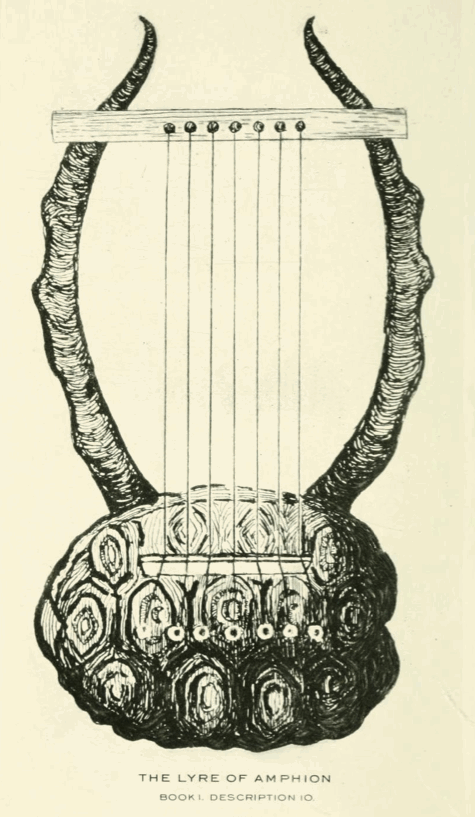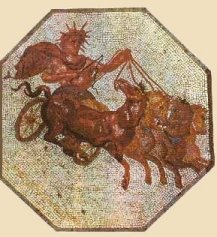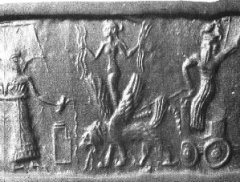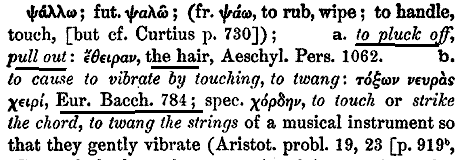Outward Command:
SPEAK "that which is written for our Learning"
ODE and PSALLO IN the
heart. Meaning Keep it Silent
BECAUSE: LEXIS or LOGOS is the OPPOSITE
of ODE which means to enchant.
Psallo is a word often connected to Apollo, Abaddon or
Apollyon. He carried his bow and made the string "twang"
to send forth a sinning arrow into the literal heart of
enemies. He also carried the Lyre which he "plucked"
intending to send forth a Love Arrow into his male of
female frieds.
Abaddon or Apollyon has been unleased from the pit and
is the leader of the LOCUSTS which we understand to be
the MUSES as his musical worship team. The muses are
known in the literature as dirty adulteresses who become
SHEPHERDESSES at Apollo's Worship Center at Delphi and
Corinth.
Psallo is USED primarily as:
psallō pluck,
pull, twitch,ps.
etheiranpluck
the hair: esp. of the bow- string,
toxōn
kheri
psallousi
neurastwangthem,
E.Ba.784;
“ kenon
kroton”
Lyc.1453; ek
keraos
ps.
belossend
a shaft twanging from the bow,
When used of musicalinstruments Psallo
means play or pluck II. mostly of the strings of
musical instruments, play
a stringed instrument with the fingers,
and not with the plectron:
Jesus
said MY WORDS are SPIRIT and LIFE. As
the antithesis to the "spirit" as a person or people
Ventus , B.
personified as deities, the winds:
te, Apollo sancte, omnipotens Neptune,
invoco; Vosque adeo, Venti! Turpil. ap. Cic. Tusc. 4, 34,
73 Lucr. 5, 1230
(1228); cf. Ov. H. 17
(18), 37.—
Spīrĭtus
The air: imber et ignis,
The BREATH of a god,
inspiration: “ spiritum Phoebus
[Apollo, Abaddon, Apollyon] mihi,
Phoebus artem Carminis Carmen , dedit, poetic spirit
or inspiration,
Hor. C. 1, 7,
23;Q. Horatius Flaccus, Odes
(ed. John
Conington)
Let others Rhodes or Mytilene
sing,
Or Ephesus,
or Corinth, set between
Two seas, or [Baccho] Thebes, or
[Apollo] Delphi, for its king
Each famous, or Thessalian Tempe
green;
There are who make chaste Pallas'
virgin tower
The daily
burden of unending song,
And search for wreaths the
olive's rifled bower:
The praise of Juno sounds from many
a tongue,
Telling of Argos' steeds,
Mycenae's gold.
Mark 6.7 He called to himself the
twelve, and began to send them out two by two; and he
gave them
authority over the unclean spirits.
Luke 8:2 and certain women who had been
healed of evil spirits and infirmities: Mary who was
called Magdalene,
from whom seven demons had gone out;
The Spirit OF God is the BREATH of God
and not a "people."
Psallo marks as Lawless those who
used a "guitar pick", beat on a drum or blew a
flute.
The Phrase: psallere
saltare
elegantius,
ē-lēgo , āvi, 1, v.
a., I.to convey
away (from
the family) by bequest,
to bequeath away,
pulso I.
Lucr. 4, 931),
to push, strike,
beat (cf.: tundo, ferio, pello).
Of musical
instruments: “chordas digitis et pectine eburno,” to strike,
play upon,
Verg. A. 6, 647: “chelyn,” (harp)
Val. Fl. 1, 139: “pectine nervos,” Sil. 5, 463:
“cymbala,” Juv. 9, 62.
A.
In gen., to
urge or drive on,
to impel, to set in violent
motion, to move, agitate,
disturb, disquiet:
C.
To
drive away, remove,
put out of the way
Psalmus , = psalmos,
I. In
gen., to play [psalmus] upon a
stringed instrument; esp., to play upon
the cithara, to sing to the cithara:
“psallere saltare elegantius,”
Sall. C. 25,
Elego I.
to convey away (from
the family) by bequest, to bequeath
away,
Sal.
Cat. 25 In the number of those ladies
was Sempronia, a woman who had committed many crimes
with the spirit of a man. In birth and beauty, in
her husband and her children, she was extremely
fortunate; she was skilled in Greek and Roman
literature; she could
sing, play, and dance, with
greater elegance than became a woman of virtue, and
possessed many other accomplishments that tend
to excite the passions. But nothing was ever
less valued by her than honor or chastity.
The Phrase: “cantare
et
psallere
jucunde,”
jūcundus (jōcundus ), a, um,
adj. jocus, I. pleasant, agreeable,
delightful, pleasing (syn.: gratus,
blandus; “class.):
est
mihi
jucunda
in
malis et
grata
in
dolore
vestra
erga
me
voluntas, “verba
ad
audiendum
mălus , evil,
wicked, injurious, destructive, mischievous,
hurtful :
carmen, i. e. an incantation, Leg. XII. Tab.
ap. Plin. 28, 2, 4, §
17: “abi in malam rem,” go and be hanged!
burdensome, plagis
“male tibi esse malo quam molliter,” I
would rather you should be unfortunate
than effeminate, Sen. Ep. 82,
1: “cantare et psallere,” Suet. Tit. 3:
The Graces as Muses were
"blue-eyed blond musical prostitutes." They were
Abaddon-Apollyon's Praise Team.
"Philodemus
considered it paradoxical that music should be
regarded as veneration
of the gods
while musicians were paid for performing this so-called
veneration. Again, Philodemus held as
self deceptive the view that music mediated
religious ecstasy. He saw the entire
condition induced by the noise of
cymbals and tambourines as a disturbance of the spirit.
He
found it
significant that, on the whole, only women and
effeminate men fell into this
folly.
Accordingly, nothing
of value could be attributed to
music;
it was no more
than a slave
of the sensation of pleasure, which
satisfied much in the same way
that food and drink did.
The Phrase: gratus,
blandus; The New Hermeneutics or the Kairos
Time
Grātus
or kharis religion
beloved, dear,
acceptable, pleasing, agreeable
“Herophile Phoebo grata and: “superis deorum gratus (Mercurius)
et imis, “carmina,”
id. C. 1, 15, 14;
3, 11, 23: “artes,” id. ib. 4, 13, 22: “error
mentis, favorite,
darling: deserving
or procuring thanks Grata testudo Jovis,” [G1361 Diotrephes]

testūdo Hermes made the
first lute or lyre from a tortoise-shell while
still in his crib. He is a type of Jubal. 1.
Of any stringed instrument of music of an arched
shape, a lyre, lute, cithern
Mercŭrĭus ,
ii, m., = Hermēs,
as a herald, the god of dexterity;
in speaking, of eloquence; the
bestower of prosperity; the god of traders
and thieves; the presider over roads, and
conductor of departed souls to the Lower World:
Mercury or Hermes (Kairos) while still in his
cradle scouped out a turtle and made the first lyre:
the turtle should be graceful that it would be
worshipped even today for its contribution Diotrephes
He gave this harp to Apollo, Abaddon or Apollyon who
is YOUR musical worship leader even today.
G1361 Diotrephes
dee-ot-ref-ace' From the alternate of G2203 and
G5142; Jove nourished;
Diotrephes, an opponent of Christianity:
From:.
Trepho (g5142) tref'-o; a
prim. verb (prop.
threpho, but perh. strength. from the base of
5157 through the idea
of convolution);
prop.
to stiffen, i.e.
fatten (by impl. to cherish
[with food, etc.], pamper, rear): - bring up, feed, nourish
trephô similar words mean that
the was RAISED
UP by Zeus.
Hor.
Ars 395 Orpheus, the priest and
interpreter of the gods, deterred the savage race of
men from slaughters and inhuman diet; hence said to
tame tigers and furious lions: Amphion
too, the builder of the Theban wall,
was said to give the stones motion with the sound of
his lyre, and to lead them whithersoever he would, by
engaging persuasion
“Pythia cantica” Hor. Ars 414, songs like the hymns which
were sung in honor of Apollo, by the chorus
in some comedies. A player, called Pythaules,
played during the intervals when the chorus left off
singing.
Grata or GRACE in
the sense of the Graces and Muses who were musicians
under Apollo or Abaddon at Delphi where the Phythian
serpent was worshipped. Other forms are:
khairō1.
c. dat. rei, rejoice at, take pleasure in
a thing, “ nikē”Il.7.312;
“ phēmē”
Od.2.35;
“ dōrō”
Hes.Op.358;
“ molpa
[sing and dance], hē,
(melpō)A.dance
or rhythmic movement with song, 2.
more freq. song, suriggos
ekhōnthe
note, klagg-ē
klagg-ē twang
of the bow howling of wolves and lions, baying
of dogs, also,
of musical instruments of song k. aēdoneios
|



